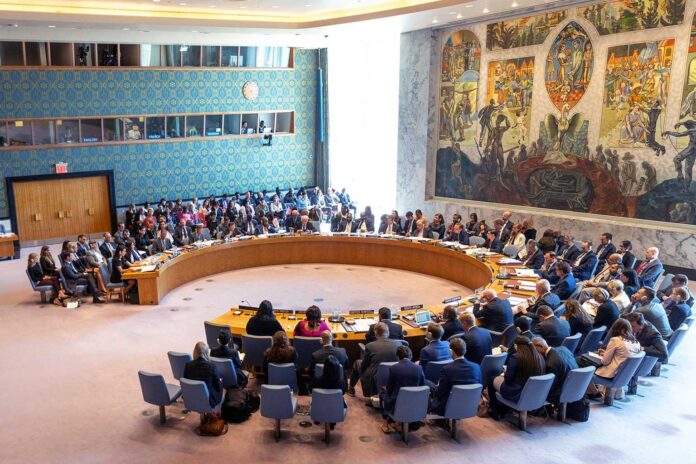The debate over reforming the United Nations Security Council (UNSC) has persisted for decades, but recent geopolitical shifts have renewed calls for change. One of the most compelling arguments is Africa’s bid for a permanent seat at the UNSC, a demand increasingly seen as both justifiable and necessary in today’s global landscape.
Historical context and the case for reform
Established in 1945, the UNSC has five permanent members—China, France, Russia, the United Kingdom, and the United States—reflecting the post-World War II power structure. This configuration, unchanged for nearly 80 years, has been criticized for being outdated, particularly as global power dynamics have shifted significantly. Africa, home to 54 countries and over 1.3 billion people, remains underrepresented, with no permanent seat at the table.
The African Union (AU) has been vocal about the continent’s exclusion from the UNSC’s permanent membership. In 2005, the AU adopted the Ezulwini Consensus, which demands two permanent seats for Africa with all the rights and privileges, including veto power, as well as five non-permanent seats. The consensus reflects Africa’s growing assertiveness in global governance issues and its desire to rectify historical injustices.
Africa’s role in global security and development
Africa’s exclusion from the UNSC’s permanent membership is increasingly difficult to justify, given the continent’s critical role in global security and economic development. Africa is often the focus of the Council’s agenda, with a significant number of peacekeeping missions and resolutions related to African conflicts. As of 2023, nearly 70% of the UNSC’s discussions concern African issues, yet African voices are often sidelined in decision-making processes.
Economically, Africa’s potential is vast. The continent is home to some of the world’s fastest-growing economies and is rich in natural resources. With the implementation of the African Continental Free Trade Area (AfCFTA), which aims to create a single market for goods and services across the continent, Africa’s economic influence is set to grow even further. This economic clout strengthens Africa’s case for permanent representation in global governance.
Geopolitical shifts and Africa’s strategic importance
The global geopolitical landscape is shifting, with emerging powers like India and Brazil also demanding greater representation at the UNSC. In this context, Africa’s bid for a permanent seat aligns with broader calls for a more equitable and representative global order. The ongoing conflicts in Ukraine and tensions in the Indo-Pacific have highlighted the limitations of the current UNSC structure, which many argue no longer reflects the realities of the 21st century.
Africa’s strategic importance is also underscored by its role in addressing global challenges such as climate change, migration, and terrorism. The continent is disproportionately affected by climate change, despite contributing the least to global greenhouse gas emissions. As climate change exacerbates food insecurity, displacement, and conflict in Africa, the continent’s leadership and voice are crucial in global climate discussions.
Moreover, Africa’s young population, expected to double by 2050, represents a significant demographic shift with implications for global labor markets, migration, and economic growth. The continent’s future, therefore, is not just Africa’s concern but a global one.
Challenges and the path forward
Despite the strong case for Africa’s inclusion as a permanent UNSC member, several challenges remain. The reform of the UNSC requires the agreement of two-thirds of the UN General Assembly’s 193 member states, including the approval of all five permanent members. Historically, the permanent members have been resistant to changes that could dilute their influence, particularly the veto power.
There are also internal challenges within Africa. The Ezulwini Consensus, while a unified stance, does not specify which countries should occupy the permanent seats. This has led to debates among African nations, with regional powers like South Africa, Nigeria, and Egypt often cited as potential candidates. Achieving a consensus within Africa on this issue is crucial for strengthening the continent’s bid.
However, the momentum for reform is growing. Global support for Africa’s bid has increased, with many countries recognizing the need for a more inclusive UNSC. During the 2023 UN General Assembly, several world leaders, including those from Europe and Asia, reiterated their support for Africa’s inclusion as a permanent member. The G4 nations—Brazil, Germany, India, and Japan—who are also seeking permanent seats, have expressed solidarity with Africa’s demands.
A more equitable global order
The inclusion of Africa as a permanent member of the UNSC is not just about correcting historical injustices; it is about creating a more equitable and effective global governance system. Africa’s role in global security, its economic potential, and its strategic importance in addressing global challenges make its exclusion from the UNSC’s permanent membership increasingly untenable.
As the world grapples with complex, interlinked crises, the need for a UNSC that reflects the realities of today’s world is more urgent than ever. Africa’s demand for a permanent seat is a call for a more balanced, just, and inclusive global order—one that truly represents the diversity of the world it seeks to govern.










